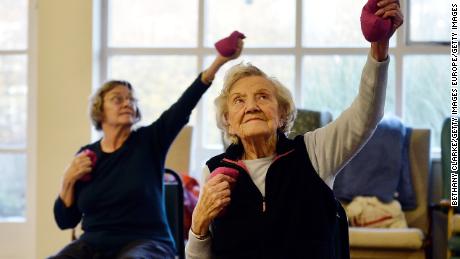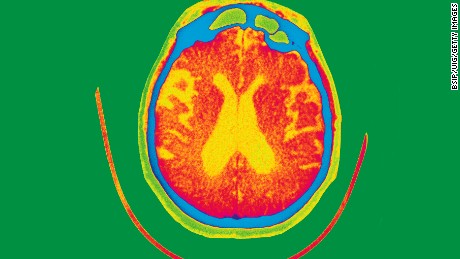The first symptom is likely a loss of interest in life and the well-being of others. A person might ignore their spouse or children’s feelings, get uncharacteristically frustrated and say or do inappropriate things — such as laugh at a funeral.
Even worse, they’ll likely have no idea they have changed.
“It’s a pretty devastating disease that impacts people in the prime of their lives,” said neurologist Kaitlin Casaletto, an assistant professor in the Memory and Aging Center at the University of California, San Francisco. “It’s especially hard on family members who can see the changes in their loved one they themselves often can’t see.”
Science has struggled to provide interventions to help these patients. Now, a new study published Wednesday suggests that lifestyle changes may help slow the disease progression.
Casaletto and her colleagues followed the activity levels of 105 people with the inherited form of the disease, the first study to do so in this population. They found people who ranked highest in levels of mental and physical activity slowed their functional decline from the disease by half.
“This is an extremely important study providing the strongest evidence yet that lifestyle factors can positively impact brain health, not only for Alzheimer’s disease, but frontotemporal lobar dementia as well,” said neurologist Dr. Richard Isaacson, director of the Alzheimer’s Prevention Clinic at Weill Cornell Medicine.
“The study is even more impactful in that patients had a gene that would definitely cause dementia, but they were still able to impact cognitive decline by over 55%,” Isaacson said.
“It was a remarkable effect to see so early on,” Casaletto said. “If this were a drug, we would be giving it to all of our patients.”
A devastating disease
An estimated 50,000 to 60,000 Americans live with FTD or frontotemporal dementia, Casaletto said. About 30% of all cases are inherited. In comparison, only about 1% of Alzheimer’s cases are passed on via a familial gene, she said.
In the most common form of FTD, called “behavioral variant,” the executive (frontal) and emotive (temporal) parts of the brain are affected, thus impacting a person’s ability to control their thinking and emotions.
“The connection between the two is critically important,” Casaletto said. “So if you think of the frontal lobe as the start-stop inhibition control center, with the temporal lobe in charge of empathy and anger, you can imagine that when those start to degenerate how wildly unregulated one can become.”
In two other variants, the disease attacks areas of the frontal lobe responsible for names of objects and pronouncing words, leading to difficulty with reading, writing and speaking.
As the diseases progress, people have trouble concentrating, planning, making decisions and understanding conversations. They begin overeating, or forget to bathe. They may become compulsive buyers, steal from neighbors or rummage in their garbage, even shoplift at stores. Sometimes, they might begin to walk more slowly, show less muscle strength and have trouble swallowing.
There is no cure, and little science can do. Antidepressants called selective serotonin reuptake inhibitors may help with irritability, agitation and apathy. Life span after diagnosis is only six to 10 years.
The role of mental and physical activity
Ongoing research in Alzheimer’s suggests lifestyle factors such as adequate sleep, a healthy diet, and physical and mental exercises can improve brain health. In fact, a
recent study on Alzheimer’s found personalized lifestyle interventions not only stopped cognitive decline in people at risk for Alzheimer’s, but actually increased their memory and thinking skills within 18 months.
But no one had ever studied those interventions in frontotemporal dementia.
“There’s incredible variability in FTD, even among people with the same genetic mutations driving their disease. Some people are just more resilient than others for reasons we still don’t understand,” Casaletto said. The study was designed to explore the role of lifestyle in those differences.
People with FTD in the study were mostly asymptomatic or had only mild, early-stage symptoms. Caregivers were asked to rate their loved one’s cognitive and physical activity over several years. The type of physical activity wasn’t critical — it could be walking, jogging, even doing heavy housework or yard chores.
“Studies show even walking is associated with better cognitive outcomes,” Casaletto said. “It seems that every movement counts.”
A cognitively active lifestyle was defined as reading, writing, going to a concert, socializing, doing games, puzzles and hobbies, she said, anything that challenges the brain.
MRIs recorded disease levels in the brain at the start of the study; participants were given tests of thinking and memory and then rechecked annually. The results at the end of two years were surprising: Despite continued degeneration of brain tissue on scans, the people who scored in the top 25% of either mental or physical activity performed twice as well on cognitive tests as those in the lowest 5% of activity.
“Our results suggest that even people with a genetic predisposition for FTD can still take actions to increase their chances of living a long and productive life,” Casaletto said. “Their fate may not be set in stone.”
The study will continue and researchers plan to outfit participants with activity trackers to better understand which type of physical activity may be most beneficial. They also plan to tease out other factors that might be involved; at this time, the results are only a correlation.
Despite this study’s limitations, this small but growing pool of research should be a wake-up call to anyone facing a diagnosis of dementia, Isaacson said.
“It is essential for people at risk for dementia and their physicians to change their thinking from, ‘There is nothing we can do,'” Isaacson said. “People at risk should feel empowered and hopeful that they can take some degree of control of their brain health.”





























